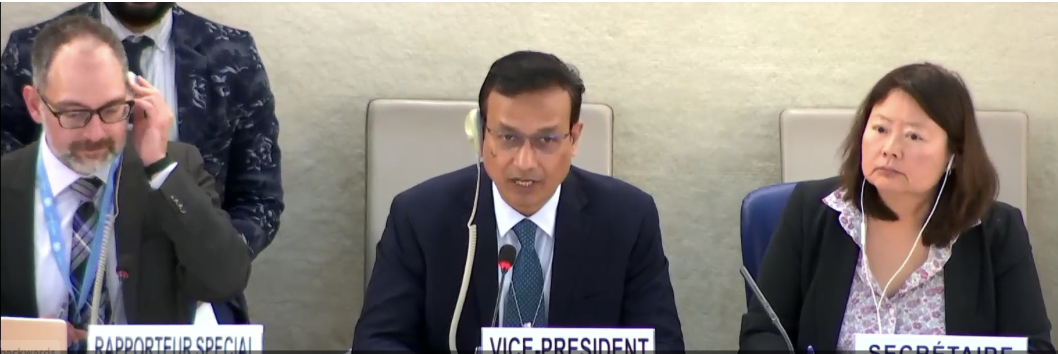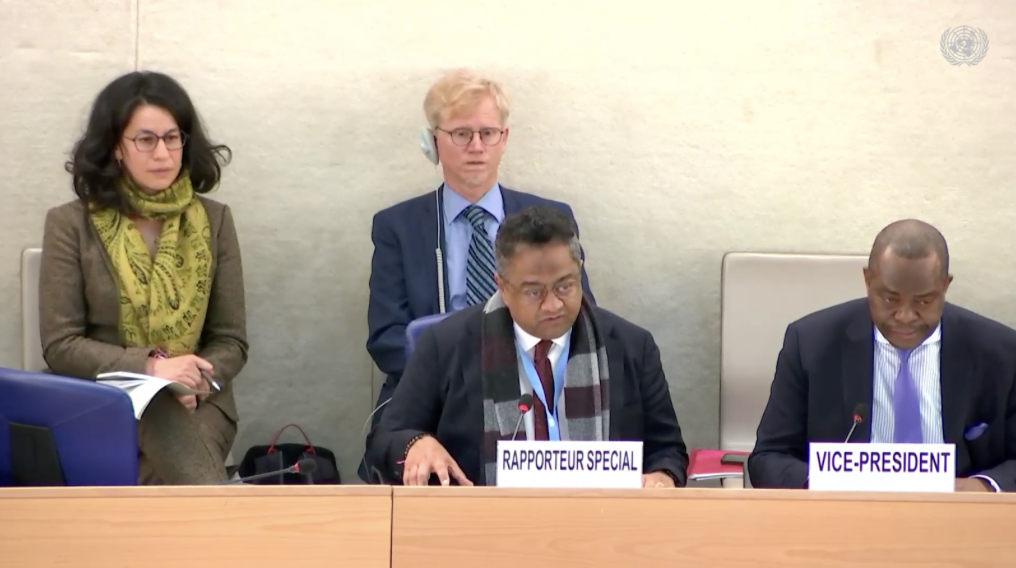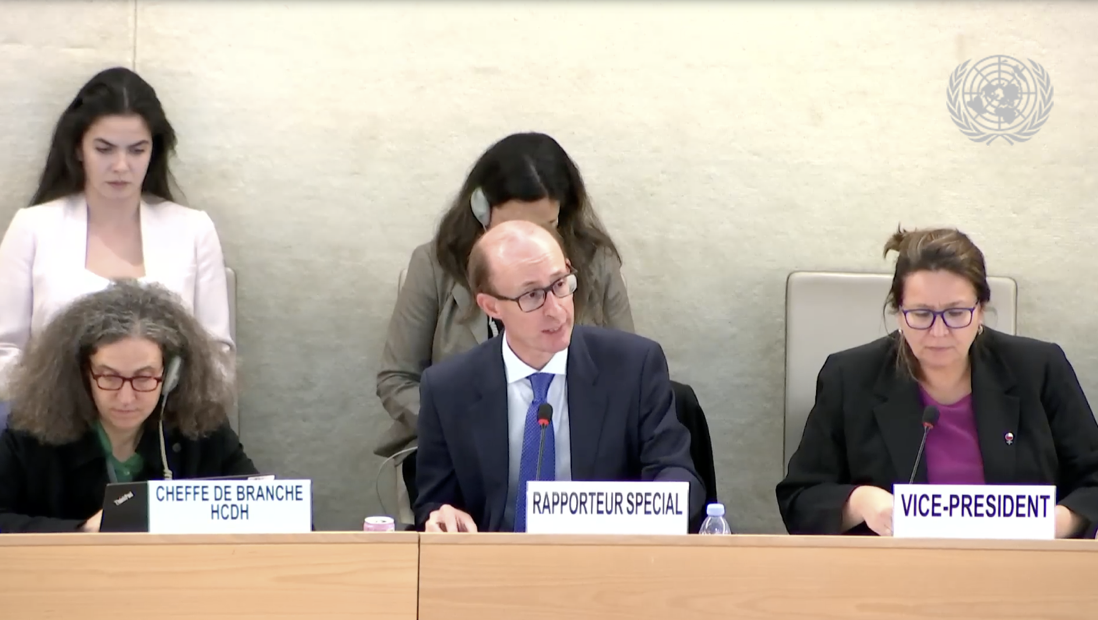23 January - 3 February 2023
Review of Argentina – 4th Cycle
23 January 2023

By Sasha Granelli / GICJ
On the 23rd of January 2023, the Universal Periodic Review (UPR) Working Group of the UN Human Rights Council conducted its fourth periodic review of the human rights situation in Argentina. The country submitted its report on the 10th of October 2022. Taking into account recommendations made by Treaty Bodies experts, the Human Rights Council and civil society organizations who delivered a report with a compilation of different human rights issues in Argentina. During the interactive dialogue, participating delegations not only congratulated Argentina for the excellent work undertaken in this Council by Argentina, but also the major steps taken to ensure human rights especially in the field of women’s rights and sustainability. However, multiple States have raised issues that still need to be considered by Argentina. Among the topics discussed was the need to reduce police brutality, access to high-quality education, protect vulnerable people, reduce inequalities, combat gender-based violence, ensure free access to health services and implement the Convention against torture.
Geneva International Centre for Justice (GICJ) calls on Argentina to ensure equal access to health services and education without discrimination. GICJ urges the country to take important measures to reduce poverty in the country because they have negative effects on human rights.
Background
The Universal Periodic Review (UPR) is a UN mechanism established in 2006 (Res. 60/251) to examine the progress made by countries in compliance with their obligations under international law. UN member states are examined during each cycle, the current one being the fourth cycle. Argentina was first reviewed in 2008, in 2012, and finally in November 2017.
Argentina submitted its country report for the fourth cycle of the UPR in October 2022. During the third cycle they received a total of 210 recommendations, they emphasized that they fully implemented most of the recommendations they received. These recommendations are related to the combat against discrimination and gender-based violence, ensuring equal access to health and education, addressing hate crimes and hate speech, combating human trafficking, ensuring fundamental rights for vulnerable people, women, children ,and indigenous people.
Taking into account recommendations made by treaty bodies experts, the Human Rights Council and civil society organizations delivered reports with a compilation of different human rights issues in Argentina. Concerns were raised about the country’s cooperation with human rights mechanisms, the national human rights framework, the respect of principles such as equality, fundamental freedom, prohibition of human trafficking, right to health, education, but also the rights of specific people such as minorities.
Discussion with the Representative of Argentina
The Secretary for Human Rights of Argentina, Horacio Pietragalla Corti, represented his country for its Fourth Cycle review as part of the Universal Periodic Review on January 23rd 2023. The report showed that the new national government wanted to commit to improving institutional quality and ensure the upholding of human rights. In the report, the government noted that they had taken different measures to promote human rights in particular for the most vulnerable groups.

Argentina, in its report, recognized that the pandemic had a very negative impact on human rights and created disproportionate inequalities as poverty grew, especially in the fields of health and education. However, they assured that necessary measures were taken to mitigate the impact of the pandemic, for example they highlighted the current legal framework that guarantees universal access to free and inclusive public health care without discrimination.
Concerning education, in its report, Argentina noted multiple measures that have been taken to ensure equal access to education, just like the National Education Act which ensures access to equal, free and secular education. As part of efforts to improve universal access to education, scholarships are granted to help students to complete compulsory schooling. Moreover, the national Government promotes an inclusive education policy for persons with disabilities at all levels and in all parts of the system.
Related to the combat against institutional violence, Argentina notes the establishment of the Unit for the Prosecution of Institutional Violence, tasked with investigating cases of institutional violence and prosecuting its perpetrators. To raise awareness, the Argentinian Secretariat for Human Rights leads a campaign to support the victims and training with the security forces to eradicate practices that violate human rights. The government also works to solve the shortage of space in prisons and enhance the living conditions of prisoners.
Argentina emphasized its action in order to eradicate gender-based violence, as in September 2022, the National Action Plan for Combating Gender-Based Violence for the period 2022–2024 was issued. Multiple data is registered concerning feminicide and violence against women and support for women is ensured. Moreover, the Ministry for Women, Gender and Diversity was established in December 2019. Policies are developed to reduce inequalities in general. Mandatory training is provided for gender-based violence for all persons working in the public service.
Concerning access to sexual and reproductive rights, the Ministry of Health works to facilitate universal access to sexual and reproductive healthcare services and legislative measures are taken to ensure access to legal abortion, just like the Act on Access to Voluntary Interruption of Pregnancy. Training sessions were held to inform pregnant women, to reduce the danger of adolescent pregnancy and to alert on the different sickness and transmitted infections. Multiple funds are developed to make contraceptive methods available for all.
In the report, Argentina recognized that the global crisis has exacerbated the precarious economic and social crisis and raised poverty, destitution and external debt levels. This precarious situation has forced the current national Government to invest heavily in several programmes designed to protect, support and assist all affected sectors of society and families.
Equal access to health and education
 Since the Covid-19 pandemic had a significant impact on economic and social life for all, inequalities and discrimination that already existed before, spread faster in Argentina. Therefore, a large part of the population falls into extreme poverty and can’t access health services or education. Likewise, discrimination against indigenous people or minorities grew due to the crisis. Most of them can’t access basic services, which contradicts the respect and protection of human rights. Some participating countries like Qatarhighlighted the need to ensure access to high-quality education for all without discrimination. Similarly, Portugal has called on the government to guarantee access to mandatory education for all children. Especially during the pandemic, a lot of schools had to close which left the children from a lower socioeconomic level without any access to education.
Since the Covid-19 pandemic had a significant impact on economic and social life for all, inequalities and discrimination that already existed before, spread faster in Argentina. Therefore, a large part of the population falls into extreme poverty and can’t access health services or education. Likewise, discrimination against indigenous people or minorities grew due to the crisis. Most of them can’t access basic services, which contradicts the respect and protection of human rights. Some participating countries like Qatarhighlighted the need to ensure access to high-quality education for all without discrimination. Similarly, Portugal has called on the government to guarantee access to mandatory education for all children. Especially during the pandemic, a lot of schools had to close which left the children from a lower socioeconomic level without any access to education.
Concerning health, countries like Saudi Arabia have recommended that Argentina continue its efforts to ensure free and universal access to health care for all. Therefore, Argentina needs to put an adequate budget in the field of health and ensure campaigns around Argentina to ensure access for all.
Combat against institutional violence
 Institutional violence is a large problem in Argentina, especially during the pandemic of the Covid 19 with the use of excessive violence by police forces. During social protests, the use of violence by police against indigenous people has been reported multiple times. These cases need to be investigated and punished in order to stop impunity. This problem was denounced by multiple states like the United Kingdom, which called for the enforcement of the accountability system to combat institutional violence. The United States of America also called for Argentina to ensure the investigation of all human rights violations by the police forces. India recommended that the State comply with the Paris Principles in appointing the National Ombudsman person.
Institutional violence is a large problem in Argentina, especially during the pandemic of the Covid 19 with the use of excessive violence by police forces. During social protests, the use of violence by police against indigenous people has been reported multiple times. These cases need to be investigated and punished in order to stop impunity. This problem was denounced by multiple states like the United Kingdom, which called for the enforcement of the accountability system to combat institutional violence. The United States of America also called for Argentina to ensure the investigation of all human rights violations by the police forces. India recommended that the State comply with the Paris Principles in appointing the National Ombudsman person.
Women’s rights and gender-based violence
 Despite the important progress made by Argentina in the field of women’s rights and gender based violence, some measures still need to be taken as violence and discrimination continue to happen in part of the country. Romania recommended that the government continue the implementation of the National Plan to combat gender-based violence and establish multiple policies dealing with different kinds of gender-based violence. Ukraine also calls on Argentina to strengthen the policies to protect women against violence and develop real prevention, reparation and assistance to the victims. Similarly, there is a need to coordinate all the data on this subject to facilitate the work of police through the implementation of a unified system for the registration of gender based violence, as Belgium recommended. They also call Argentina to ensure access to abortion everywhere in Argentina especially in the retirement area.
Despite the important progress made by Argentina in the field of women’s rights and gender based violence, some measures still need to be taken as violence and discrimination continue to happen in part of the country. Romania recommended that the government continue the implementation of the National Plan to combat gender-based violence and establish multiple policies dealing with different kinds of gender-based violence. Ukraine also calls on Argentina to strengthen the policies to protect women against violence and develop real prevention, reparation and assistance to the victims. Similarly, there is a need to coordinate all the data on this subject to facilitate the work of police through the implementation of a unified system for the registration of gender based violence, as Belgium recommended. They also call Argentina to ensure access to abortion everywhere in Argentina especially in the retirement area.
Eradication of poverty
Due to the crisis caused by the pandemic of the Covid 19, the standard of living of many inhabitants has declined. Already a large part of the population was in precariousness before that, but the State tried to develop measures and policies to ensure a solution to this problem. Therefore, this situation has worsened to lead to extreme poverty. Because of the crisis, more measures need to be implemented. That is why, several States have called Argentina to develop standards of living and apply it to all and to implement a poverty strategy to eradicate it, this was proposed by Poland. Brazil also recommends that Argentina ensure a program for income to ensure access to food and other basic needs for the most vulnerable part of the population to eradicate extreme poverty. Moreover, countries like Chile ask Argentina to adopt measures to protect the economic, social and cultural rights of people living in extreme poverty, especially those affected by the pandemic crisis.
Position of Geneva International Centre for Justice
Geneva International Centre for Justice (GICJ) in line with the recommendations made by participating States, calls for Argentina to ensure equal access for all its population to basic services and to ensure the respect of human rights for all without discrimination. The country is urged to investigate and punish all acts of police brutality and gender-based violence.
#UPR #Argentina #Human_Rights #Justice #Geneva #Geneva4Justice #GICJ #GenevaInternationalCentreforJustice












